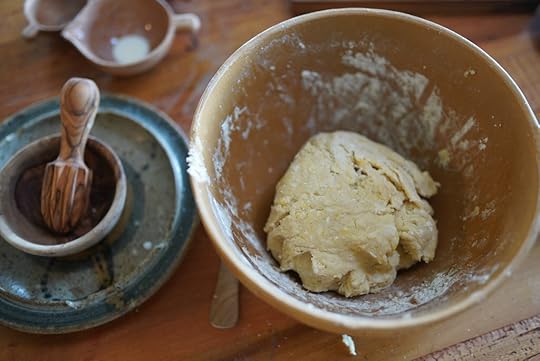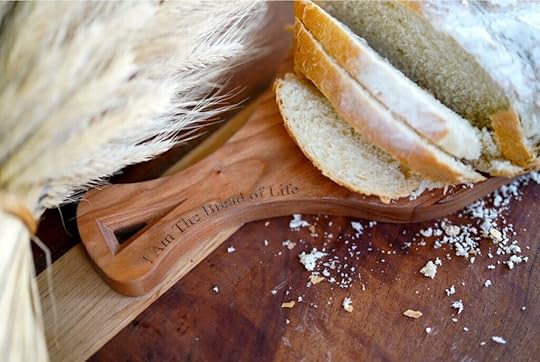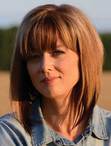When God Doesn’t Give Us the Life or the Body We Want
Kendall Vanderslice has spent her whole life struggling to love her body. Since childhood, she’s been embarrassed by her appetite and her desire to enjoy good food. She’s been ashamed of her weight and jealous of those who seem to navigate life with carefree ease. But when she embarked on a career as a professional baker, God showed her how He uses our hunger to draw us close. In By Bread Alone, Kendall invites us to see the tangible ways the Bread of Life uses actual bread to teach us about the goodness of our bodies and the Body of Christ. It is a grace to welcome Kendall to the farm’s table today…
Guest Post by Kendall Vanderslice
“Do you want to be a mother?” my new friend Aminah asked. She’d been observing me as I played with her daughters while she prepared dinner.
By holding back hope, I thought I’d be able to hold back the intensity of my longing.
My eyes began to well with tears at her question. I tried not to allow myself to think about my longing for a family. Several of my friends had received PCOS diagnoses recently after struggling for years to conceive. I’d been living with my own diagnosis for over a decade, as well as continued frustration in the dating realm.
As the belief that God would never answer my prayer for a partner took root, along with the growing awareness that my body might not be able to hold on to a pregnancy if given the chance, I learned to dam up hope of marriage and motherhood. By holding back hope, I thought I’d be able to hold back the intensity of my longing. Somehow the hollowness seemed more manageable than drowning in disappointment.








God has said no to the family I want, I told myself. Rather than exert any more energy pleading for a partner, I begged God to give me peace. Aminah shifted the subject, which I was grateful for, as I didn’t want to sob in the middle of their family dinner.
As the meal went on, we talked about teaching and writing and, naturally, bread. We cleared the table and discussed my indecision over whether to pursue doctoral work; she heard my anxieties over the future—the same ones I’d been mulling over for the past few years. I held many dreams but struggled to understand how they might all piece together.
Her hands were deep in suds, washing dishes, when I said, “I just want to write and bake and teach!”
God was inviting me to feel the full intensity of my longing, to allow those longings to shape and soften me…
She reached over, taking my hands in her own, and replied, “And to be a mother. You are allowed to say it.”
Something inside me broke open. That dam I’d so carefully constructed broke, and I could no longer ignore the intensity of my desire. I held in my tears until I reached the car, when I turned on the music she’d given me: an album of music focused on themes of extended waiting.
The next day I embarked on a thirteen-hour road trip to visit my family and I wept on and off the entire way. The prayers and tears flowed not just out of loneliness or disappointment but out of my anger at God and my anger at my lack of control.
“Wait for the Lord, whose day is near,” I sang with the Taizé chants on my playlist. “I waited for the Lord / God heard my cry.”
“I’ve waited,” I yelled, banging on my steering wheel as I wound up I-95 through Virginia. “But you’re not listening!” I screamed.
“You can do anything,” I sobbed. “Why won’t you step in here?”
I balled my fists, searching for release of some sort but out of words to convey the depth of my heartache. I’d leaned into the community God had put before me. I’d tried to make peace with the idea that I might never bear children or find a spouse. But as sweet as my friendships and church relationships were, the hollowness remained.









As I allowed my tears and my anger to flow, I sensed that God might not be asking me to let go of my desire, challenging me to be content living without the family I wanted. My singleness was not a mathematical equation I could solve by calculating God’s answers to other women’s prayers. It was not a game I could win with the right amount of contentment. It was not a burden I needed to release so I could see the joy.
Rather, God was inviting me to feel the full intensity of my longing, to allow those longings to shape and soften me, as water softens the fibrous compounds in wheat. God was inviting me to weep and mourn the pain of unfulfilled desire without attempting to make sense of it all.
It is the breaking that allows us to eat and, in our eating, to be transformed.
There was no assurance that doing so would be the key to unlocking my desire—in fact, it held the potential for deeper pain if my prayers remained unanswered. But learning to long also brought with it the freedom to hope, so I decided to give them both a try. The dams I’d built to block my sadness gave in the rest of the way. My emotions came over me in heavy waves. But I found a new tenderness there too.
In Christian tradition, one of the primary means of knowing God is by breaking. In the sacrament of the Eucharist, the breaking of the loaf marks the moment of mysterious transformation from ordinary bread into Jesus’ Body. It was the breaking of bread that alerted the disciples of Christ’s presence on the path to Emmaus.
In the Gospel account, the disciples walked and talked with a stranger for hours about the perplexing accounts of Jesus’ resurrection. Only when the stranger broke bread and extended it to them did they realize he was Jesus, the one who had been walking with them all along.
Breaking is a necessary aspect of remaking. It is the breaking that allows us to eat and, in our eating, to be transformed. It is the sharing of a broken loaf that binds us together in community.
In the collapse of my emotional dams, I felt hope and longing wash over me, transforming me. This breaking alerted me to the nearness of God in my weeping. It allowed me to see God not as a divine puppeteer holding me back from the good things I desired but as a tender mother holding me in her arms, her tears mingling with my own.

Kendall Vanderslice is a baker and writer who lives in Durham, North Carolina, with her beagle, Strudel. Yes, Vanderslice is truly her last name! When she embarked on a career as a pastry chef, she found that her love of bread transformed the ways she read Scripture. Fascinated by God’s use of food throughout the arc of the Gospels, she merged her work in the kitchen with academic study of food and theology. These days her best thinking takes place when she’s got dough between her fingers. You can follow her work at www.edibletheology.com.
Kendall’s new book, By Bread Alone: A Baker’s Reflections on Hunger, Longing, and the Goodness of God shares the lessons God has taught her through bread. It’s a book for those with messy relationships with their own bodies, or with bread, for those who don’t quite feel like they belong. God doesn’t always answer our prayers in the ways we hoped, but God offers us tangible reminders of God’s love nonetheless. And somehow, that’s enough.
[ Our humble thanks to Tyndale for their partnership in today’s devotional. ]
Ann Voskamp's Blog
- Ann Voskamp's profile
- 1368 followers



